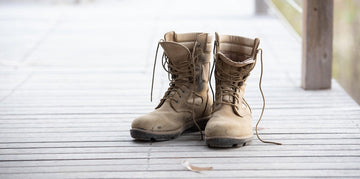Good socks for work boots can significantly improve our work efficiency. In this guide, we will explore in detail the importance of work boot socks, work boot sock selection criteria, and recommendations for the best work boot socks.
Why are work boot socks important?
Do you often experience sweaty feet, blisters, odor and fatigue at work? Work boot socks not only protect your feet, but also greatly improve your work efficiency. According to the American Podiatric Medical Association, 63% of blue-collar workers suffer from blisters caused by sock friction, often as a result of not wearing work boot socks correctly.
In the construction site, humid environment is everywhere, which is the place where fungi and bacteria gather in large quantities. And work boot socks can quickly absorb moisture and sweat to keep your feet dry.
When working outdoors in winter, work boot socks made of alpaca wool, for example, keep feet consistently warm and prevent frostbite due to their natural thermoregulatory ability.
The 4 gold standards for work boot socks
1.Material: natural fiber (alpaca wool) vs. synthetic fiber (nylon, polyester)
Alpaca wool socks for work boots are undoubtedly the right choice. Alpaca socks have natural moisture wicking properties and thermal insulation compared to traditional work boot socks made of synthetic fibers such as nylon and polyester. Whether you are working in the construction site or steel mill, or in the cold storage or outdoor inspection, alpaca socks as your work boots socks is the smartest choice.
2.Support and fit
Good support and perfect fit is another criterion for choosing socks for work boots. Socks without padding or support tend to make us feel fatigued after 1-2 hours of work, while ill-fitting socks can lead to blisters on the feet.
Therefore, picking a good work boot sock requires attention to whether the sock has arch support and whether the toe or heel area is thickened.
3. Breathability and temperature control
Humid environment will lead to bacteria growth, odor and blisters, excellent temperature regulation will reduce the fatigue of feet and improve work efficiency. Alpaca socks can keep your feet dry and comfortable all year round. Therefore, alpaca socks with natural breathability and temperature regulation with work boots is the best combination at present.
4. Durability
Durability is the final criterion for choosing socks for work boots, after all, no one wants to change socks frequently all the time. Below is a comparison between regular cotton socks and alpaca work boot socks:
| Sock type | Average life (days) | Cost per day |
| Cotton socks | 30 | $0.16 |
| Alpaca socks | 360 | $0.04 |
(At $5/pair of cotton socks and $15/pair of alpaca socks, long-term savings of 75%.)
Best socks for work boots recommendations
Clohill offers the best socks for work boots. Made with a high content of Royal Peruvian Alpaca wool blended with nylon and Lycra spandex, they contain 1,200 natural breathable pores per square centimeter and wick away moisture up to three times faster than regular wool, making them perfect for cold chain logistics workers, healthcare workers, and precision manufacturers.
 Alpaca Sock 3 Pack
Alpaca Sock 3 Pack
Expert tip: Rotation system
Why do I need to alternate between at least 3 pairs of alpaca socks? Alpaca socks that are rotated actually last up to 40% longer. Socks need to be thoroughly air-dried for 24 hours after each day of wear. A three-pair rotation ensures that each pair receives more than 48 hours of ventilation, effectively disrupting the bacterial reproduction cycle and preserving the elasticity and performance of alpaca socks.
Frequently asked questions
1.How often should I change my work boot socks?
Cotton and other materials are generally replaced once a month, while alpaca wool socks can last up to 1-3 years.
2.Can I machine wash my socks for work boots?
If the main material of your socks for work boots is alpaca wool, we recommend that you machine wash them in cold or warm water and then air dry them naturally. Avoid machine washing and drying.
3.Are thicker work boot socks better?
No, it doesn't. The performance of work boot socks generally depends on the main material and manufacturing process, thickness does not affect the performance and comfort of the socks.









